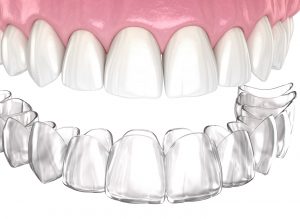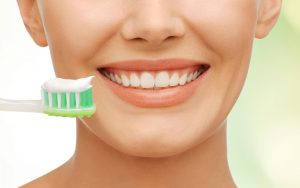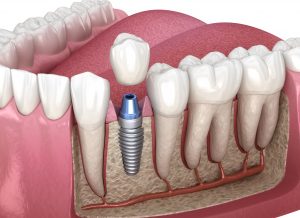 Tooth decay is often a simple problem to address. For most people, treatment simply involves cleaning the cavity that has formed in the tooth’s structure and filling it to restore the tooth’s strength and integrity. However, for others, dealing with tooth decay can mean more extensive treatment, such as removing the tissues from within the tooth’s pulp and root canal to stop the infection from getting worse. In many cases, the biggest difference between minor and severe tooth decay is time. Tooth decay is progressive, and the level of damage it causes changes depending on how soon you address it. (more…)
Tooth decay is often a simple problem to address. For most people, treatment simply involves cleaning the cavity that has formed in the tooth’s structure and filling it to restore the tooth’s strength and integrity. However, for others, dealing with tooth decay can mean more extensive treatment, such as removing the tissues from within the tooth’s pulp and root canal to stop the infection from getting worse. In many cases, the biggest difference between minor and severe tooth decay is time. Tooth decay is progressive, and the level of damage it causes changes depending on how soon you address it. (more…)
Deciding if Invisalign® Treatment Is a Good Idea
 When your teeth aren’t aligned properly, straightening them is always a good idea. Their proper alignment is an important factor in everything from the state of your oral health and integrity of your teeth to your bite’s ability to function properly, and much more. Fortunately, many patients can benefit from straighter teeth in a more convenient and discreet manner than they might expect. Instead of relying on traditional, metal orthodontic braces, it may be a good idea to choose Invisalign® clear aligners to provide a more advanced teeth-straightening solution. (more…)
When your teeth aren’t aligned properly, straightening them is always a good idea. Their proper alignment is an important factor in everything from the state of your oral health and integrity of your teeth to your bite’s ability to function properly, and much more. Fortunately, many patients can benefit from straighter teeth in a more convenient and discreet manner than they might expect. Instead of relying on traditional, metal orthodontic braces, it may be a good idea to choose Invisalign® clear aligners to provide a more advanced teeth-straightening solution. (more…)
What TMJ Disorder Means and How to Deal With It
 Some concerns that you might be worried about when it comes to your dental health, like tooth decay and gum disease, aren’t that difficult to recognize if they develop. For example, the formation of a cavity caused by tooth decay often causes your tooth to hurt, which in turn prompts you to seek treatment for it. If you have gum disease, then you might notice your gums bleeding, or other signs that your gum health is compromised. However, having TMJ disorder isn’t always as straightforward as that, and recognizing it for what it is can be much more difficult on your own. (more…)
Some concerns that you might be worried about when it comes to your dental health, like tooth decay and gum disease, aren’t that difficult to recognize if they develop. For example, the formation of a cavity caused by tooth decay often causes your tooth to hurt, which in turn prompts you to seek treatment for it. If you have gum disease, then you might notice your gums bleeding, or other signs that your gum health is compromised. However, having TMJ disorder isn’t always as straightforward as that, and recognizing it for what it is can be much more difficult on your own. (more…)
Is Your Snoring a Sign of a Sleep Disorder?
 When you snore a lot, it might be annoying to your sleeping partner, but it probably doesn’t seem like a problem that could impact your overall sleep quality or systemic health. However, snoring constantly and consistently can have some impact, such as taxing your cardiovascular and respiratory systems. For some people, it can also indicate a much more serious problem than it seems at first, such as a sleep disorder like obstructive sleep apnea. If your snoring is a sign of sleep apnea, then seeking treatment for it could be more important to your sleep quality and overall health than you may realize. (more…)
When you snore a lot, it might be annoying to your sleeping partner, but it probably doesn’t seem like a problem that could impact your overall sleep quality or systemic health. However, snoring constantly and consistently can have some impact, such as taxing your cardiovascular and respiratory systems. For some people, it can also indicate a much more serious problem than it seems at first, such as a sleep disorder like obstructive sleep apnea. If your snoring is a sign of sleep apnea, then seeking treatment for it could be more important to your sleep quality and overall health than you may realize. (more…)
Is Your Gingivitis More Serious Than You Think?
 When some oral health concerns develop, they don’t always seem like the potentially serious problems they can later become. For example, one of the most consequential oral health concerns is severe gum disease, which is also the leading cause of tooth loss and, in some cases, a significant systemic health risk. However, before gum disease becomes that severe, it first starts as a relatively minor condition known as gingivitis. Unlike its more severe stage, gingivitis doesn’t always cause highly noticeable symptoms, which may fool you into believing that it isn’t that serious of a concern. (more…)
When some oral health concerns develop, they don’t always seem like the potentially serious problems they can later become. For example, one of the most consequential oral health concerns is severe gum disease, which is also the leading cause of tooth loss and, in some cases, a significant systemic health risk. However, before gum disease becomes that severe, it first starts as a relatively minor condition known as gingivitis. Unlike its more severe stage, gingivitis doesn’t always cause highly noticeable symptoms, which may fool you into believing that it isn’t that serious of a concern. (more…)
The Roles of At-Home and Professional Teeth Cleaning
 Everyone’s smile is unique, but when it comes to maintaining your good oral health, most people can benefit from similar measures. For example, everyone needs to consistently clean their teeth every day by brushing them twice and flossing them at least once, which is itself a form of preventive dental care. Also, everyone needs to attend professional dental cleanings and checkups at least twice a year, or more often if they have an existing oral health concern to worry about. (more…)
Everyone’s smile is unique, but when it comes to maintaining your good oral health, most people can benefit from similar measures. For example, everyone needs to consistently clean their teeth every day by brushing them twice and flossing them at least once, which is itself a form of preventive dental care. Also, everyone needs to attend professional dental cleanings and checkups at least twice a year, or more often if they have an existing oral health concern to worry about. (more…)
The More Intricate Way Dental Implants Replace Teeth
 Your healthy, natural teeth are more complex than they may seem at first glance. On one hand, simple things like tooth sensitivity or a slight misalignment in your teeth can seem minor, but under the surface, they could cause a range of complications with your oral health, bite function, and more. On the other hand, the role that your healthy teeth play in your oral health can also be more complicated than it seems. Today, we examine why the more intricate way dental implants replace teeth matters to your oral health, and why they’re often the best solution at fully restoring the functions of your lost teeth. (more…)
Your healthy, natural teeth are more complex than they may seem at first glance. On one hand, simple things like tooth sensitivity or a slight misalignment in your teeth can seem minor, but under the surface, they could cause a range of complications with your oral health, bite function, and more. On the other hand, the role that your healthy teeth play in your oral health can also be more complicated than it seems. Today, we examine why the more intricate way dental implants replace teeth matters to your oral health, and why they’re often the best solution at fully restoring the functions of your lost teeth. (more…)
How Tooth Loss Really Affects Your Oral Health
 One of the greatest benefits to come out of the advancement of modern dentistry is the ability for more people to preserve their healthy, natural smiles for life. That includes successfully preventing tooth loss in ways that weren’t historically possible, such as by saving teeth with highly precise and lifelike restorations. However, tooth loss does still occur, and the other great advantage of modern dental care is the ability to address it with more lifelike and successful results than ever before. With the many different ways in which tooth loss can affect your oral health, rebuilding your smile with a lifelike dental prosthesis can be essential to preserving your smile. (more…)
One of the greatest benefits to come out of the advancement of modern dentistry is the ability for more people to preserve their healthy, natural smiles for life. That includes successfully preventing tooth loss in ways that weren’t historically possible, such as by saving teeth with highly precise and lifelike restorations. However, tooth loss does still occur, and the other great advantage of modern dental care is the ability to address it with more lifelike and successful results than ever before. With the many different ways in which tooth loss can affect your oral health, rebuilding your smile with a lifelike dental prosthesis can be essential to preserving your smile. (more…)
How Can You Benefit from a CEREC Same-Day Crown?
 When a tooth is damaged or compromised enough to require a dental crown to restore it, seeking treatment as soon as possible benefits you in several ways. The faster you restore the tooth, the more of your healthy, undamaged tooth structure you can preserve. Also, the sooner you can enjoy biting and chewing comfortably and smiling confidently again. With advanced CEREC technology, we may be able to help you enjoy the benefits of a lifelike dental crown and the full restoration of your tooth sooner, by creating and placing your restoration in just one visit. (more…)
When a tooth is damaged or compromised enough to require a dental crown to restore it, seeking treatment as soon as possible benefits you in several ways. The faster you restore the tooth, the more of your healthy, undamaged tooth structure you can preserve. Also, the sooner you can enjoy biting and chewing comfortably and smiling confidently again. With advanced CEREC technology, we may be able to help you enjoy the benefits of a lifelike dental crown and the full restoration of your tooth sooner, by creating and placing your restoration in just one visit. (more…)
How Do You Decide if Your Tooth Should Be Extracted?
 Treating certain oral health concerns is much more effective when your treatment plan is custom-designed to specifically meet your needs. However, for some extreme oral health concerns, the only viable option is to extract a tooth that can no longer support your bite the way it’s meant to. Today, we examine how your dentist or oral health specialist may determine if tooth extraction is necessary, and why it’s the best option for avoiding further oral health complications. (more…)
Treating certain oral health concerns is much more effective when your treatment plan is custom-designed to specifically meet your needs. However, for some extreme oral health concerns, the only viable option is to extract a tooth that can no longer support your bite the way it’s meant to. Today, we examine how your dentist or oral health specialist may determine if tooth extraction is necessary, and why it’s the best option for avoiding further oral health complications. (more…)



